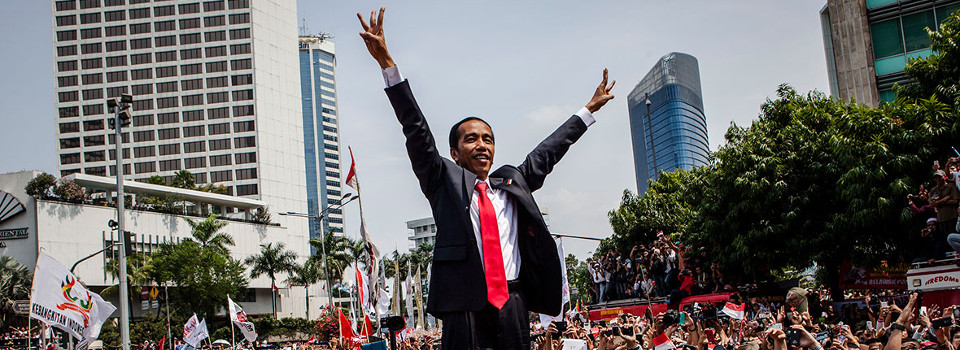Jokowi’s Win Marks Democracy’s Progress over the Forces of the Lingering Past
P RESIDENTIAL elections were a parlour game under former Indonesian strongman Suharto. His fall in 1998 inaugurated democratic elections, to which Indonesians took with gusto. However, traces of the old order remained in the largely elite backgrounds of presidential contenders. The victory of Joko “Jokowi” Widodo, the hugely popular governor of Jakarta, announced after a recount, breaks with that tradition.
Jokowi’s humble beginnings, his earnest earthiness, his effortless and unaffected empathy with ordinary citizens, his political record – untarnished by association with big money and the military – and his vision of Indonesia as a prosperous democracy set him apart from his predecessors. He is an establishment outsider.
The outgoing president, Susilo Bambang Yudhoyono, too, entered office as an outsider. Contending with the timeless guiles of a wily establishment weakened him, but Jokowi is likely to fare better than he did because, unlike the patrician Dr Yudhoyono, Jokowi is a man of the people who can reach out to the masses over the heads of contentious power blocs that might try to block him. Moreover, the governorship of the capital has honed in him some of the survival skills that he will need in his new job.
There is also the issue of character. In my meetings with Jokowi over the past year, what struck me was his moral doggedness. He is an obstinate man who will stick to a course of action once he has decided that it is the best one. Combined with that streak of stubbornness is a flat refusal to play dirty – even if his opponents do so. That is exactly what his detractors did, when they spread dark lies about his religious and political beliefs. But he refused to reciprocate.
Jokowi’s clean victory over his powerful and ambitious rival has made this election an epic fight, different not only from presidential parlour games but also the elections that followed. In a country where epics are a part of the national psyche, his victory is drenched symbolically in the triumph of the forces of good. In modern parlance, his victory marks the progress of democracy over the forces of the lingering past.
Although street violence by those opposed to him cannot be ruled out, those who might have it on their minds will have to contend with the thought that they would be contesting the mandate of the people – not a small matter in a country where citizens take their democratic enfranchisement very seriously because it was wrested from a dictator who thought that his reign was both natural and immortal.
Problems Ahead
When Jokowi takes office in October, he will invest his office with the prestige and hope of a real fresh start in Indonesian politics. He will face challenges, but should be able to meet them.
The main and most lethal challenge is likely to come from within his own political party, the Indonesian Democratic Party of Struggle (PDI-P, its Indonesian acronym). Its matriarch is former president Megawati Sukarnoputri, daughter of Indonesia’s founding president Sukarno, whose own daughter, Puan Maharani, has presidential ambitions. PDI-P sources believe that Ms Puan would keep a wary eye on Jokowi, scanning his presidency for signs of weakness or mistakes that would strengthen her hand in the next presidential election five years down the road. There are already indications that she is pushing for a PDI-P Congress this November, a year ahead of its schedule, to make a bid for the party chairmanship.
Jokowi’s constitutional position as elected president does not require him to have a parliamentary majority. Where parliamentary support would matter would be in the political field. There, the PDI-P’s showing in the April parliamentary elections – when it received less than 20 per cent of the vote – hardly gives it the clout to mount a parliamentary challenge to Jokowi, no matter how relations between him and Ms Puan turn out to be.
Instead, it is entirely possible that Golkar, the ruling party of the Suharto years which has reinvented itself as a responsible democratic party and won just over 14 per cent of the parliamentary vote, would throw its weight behind the new president. Golkar leader and top businessman Aburizal Bakrie, who aligned himself with Mr Prabowo, could even be ousted in a party coup to make way for a Golkar-PDI-P alliance. Smaller parties might join it so as not to be left in the wilderness as the new political dispensation takes shape.
Other challenges for Jokowi would include an embittered Mr Prabowo stirring the ground against him. Mr Prabowo’s nationalist appeals and his promise of decisive leadership to reinstate Indonesia’s international standing did find an audience in South-east Asia’s largest country. Jokowi’s gentler approach to international affairs could be read as a sign of weakness if Indonesia’s global footprint does not expand under him.
To make this happen, Jokowi would have to reinvigorate the economy, focusing in particular on developing the infrastructure. Here, investments from the United States, China and South-east Asian countries would help directly in supporting the economic base of his presidency.
Also, streamlining the unwieldy, inefficient and corrupt bureaucracy is a job that he has inherited from his predecessor.
There are also concerns of a resurgent Islamism undercutting Indonesia’s secular credentials. Although terrorism has been largely controlled, extremism haunts Indonesian society. Jokowi would need a tested figure from the security establishment to ensure that extremists do not treat his democratic instincts and penchant for dialogue as weaknesses to exploit violently.
However, even as these challenges loom, Jokowi has the satisfaction of being a man of the people chosen by the people to lead Indonesia on an epic voyage.
The writer, who has followed Indonesian politics since 1995, heads Pereira International, a Singapore-based political consulting company, and is also a member of the Belfer Center for Science and International Affairs at Harvard University

